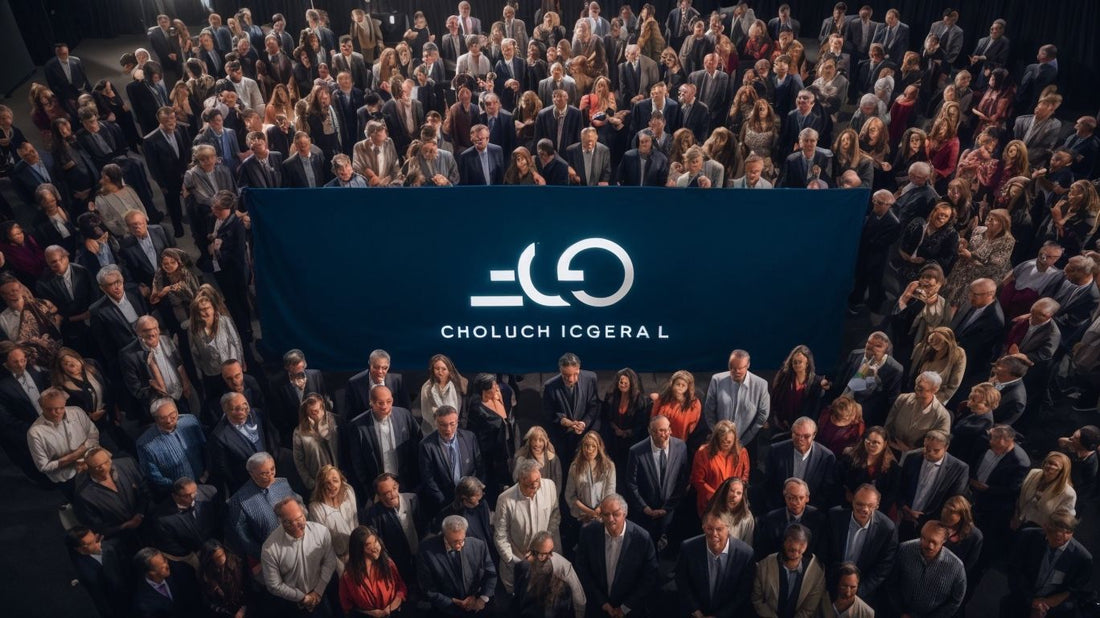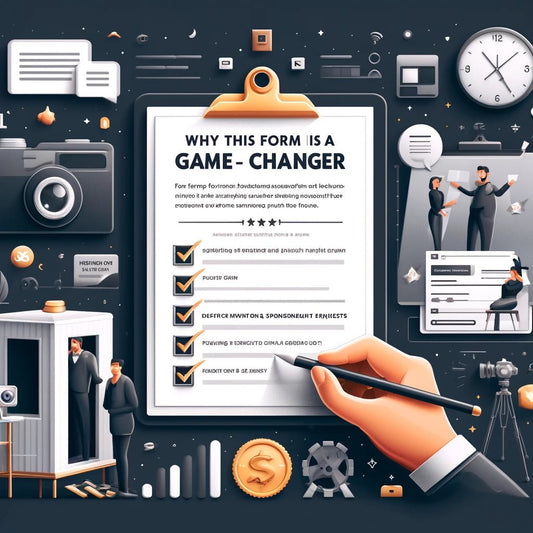
Maximize Your Brand's Exposure with Strategic Corporate Event Sponsorship
Share
.jpg)
Corporate event sponsorship plays a crucial role in the success of various events, ranging from conferences and trade shows to festivals and charity fundraisers. It involves a partnership between a company and an event organizer, where the company provides financial or in-kind support in exchange for promotional opportunities and brand exposure. Corporate event sponsorship holds immense importance as it allows companies to increase brand visibility, engage with their target audience, and showcase their products or services to a relevant market.
The benefits of corporate event sponsorship are manifold. Firstly, it provides companies with a platform to strengthen their brand image and increase brand awareness among a specific target audience. Sponsorship also allows companies to establish credibility and build positive associations with the event and its attendees. It offers opportunities for networking and relationship-building with other sponsors and industry professionals. Corporate event sponsorship can result in positive media coverage and PR opportunities, enhancing the company's reputation and visibility.
There are different types of corporate event sponsorships available, including financial sponsorship, in-kind sponsorship, and media sponsorship. Financial sponsorship involves providing monetary support for the event, while in-kind sponsorship entails offering products, services, or resources instead of direct financial contributions. Media sponsorship involves providing media exposure and promotional opportunities through various channels.
Securing corporate event sponsorship requires a strategic approach. It begins with identifying potential sponsors that align with the event's theme, target audience, and brand values. Crafting a tailored sponsorship proposal is crucial to demonstrate the value, benefits, and return on investment (ROI) that the company can expect from the sponsorship. Building strong relationships with sponsors is also essential, as it fosters trust, effective communication, and long-term partnerships.
When considering corporate event sponsorship, it is important to align the event with the brand's values and target audience. This ensures that the sponsorship creates a meaningful connection and resonates with the company's image and marketing goals. Measuring the ROI of sponsorship is another key consideration, as it helps determine the effectiveness and success of the sponsorship. Fulfilling sponsorship obligations, such as delivering agreed-upon benefits and providing post-event reports, is crucial to maintain positive relationships with sponsors.
Successful corporate event sponsorships can be seen in various examples, such as global sports tournaments, music festivals, and industry conferences. These sponsorships have showcased the power of strategic partnerships in achieving mutual goals and creating memorable experiences for event attendees and sponsors alike.
What is Corporate Event Sponsorship?
Corporate event sponsorship is a marketing strategy where a corporation financially supports an event in return for exposure and branding opportunities. It allows companies to align their brand with a specific event, reaching a targeted audience and enhancing their reputation. Corporate event sponsorship can take various forms, including sponsoring conferences, trade shows, sports events, and cultural festivals. It provides businesses with the chance to connect with their target market, build relationships, and generate positive brand associations.
So, what is corporate event sponsorship? It is an effective way for companies to increase their visibility, expand their network, and create a favorable impression among their target audience.
Why is Corporate Event Sponsorship Important?
Corporate event sponsorship plays a vital role in driving businesses forward and fostering valuable connections. Discover the immense significance of corporate event sponsorship as we delve into its undeniable benefits. From enhanced brand visibility to increased customer engagement, these sub-sections will uncover the extensive advantages that come with being a corporate event sponsor. So, let's dive in and explore why corporate event sponsorship should never be underestimated.Benefits of Corporate Event Sponsorship:
- Benefits of Corporate Event Sponsorship:
- Increased brand visibility: Sponsors gain exposure to a wider audience through event promotions and branding opportunities.
- Enhanced brand reputation: Aligning with well-executed events can boost a company's image and credibility.
- Targeted marketing: Sponsors can reach a specific demographic or target audience that aligns with their products or services.
- Customer engagement: Interactive sponsorship activations allow sponsors to connect directly with potential customers.
- Networking opportunities: Sponsors can meet and build relationships with other industry professionals and potential partners.
Types of Corporate Event Sponsorships
When it comes to corporate event sponsorships, there are various types that companies can consider. We'll dive into three key categories, each offering unique perks and possibilities. From financial sponsorships to in-kind contributions and media support, businesses have multiple avenues to explore. So, let's explore the exciting world of sponsorships and discover how corporations can make a meaningful impact through their involvement in events.1. Financial Sponsorship
Financial sponsorship, also known as event sponsorship, is a crucial form of corporate sponsorship that involves providing monetary support to an event. This particular type of sponsorship offers a wide range of benefits for both the sponsor and the event organizer.
Increased funding: Financial sponsorship plays a pivotal role in providing the necessary funds to cover various event costs, including venue rental, marketing expenses, and logistics.
Brand exposure: Sponsors receive increased visibility and gain the opportunity to showcase their brand to a targeted audience. As a result, their brand awareness and recognition are significantly enhanced.
Networking opportunities: Financial sponsors can seize the chance to connect with other businesses and industry professionals present at the event, thereby fostering potential partnerships and collaborations.
Enhanced reputation: By supporting events that align with their values and target audience, sponsors have the ability to elevate their brand image and establish themselves as advocates for important causes.
To secure financial sponsorship, event organizers must first identify potential sponsors. It is then essential to tailor sponsorship proposals in a way that highlights the mutual benefits for both parties involved. Additionally, building strong relationships with sponsors is key. By considering these pivotal strategies, both sponsors and event organizers can form fruitful partnerships that significantly contribute to the overall success of corporate events.
2. In-Kind Sponsorship
In-Kind Sponsorship is a specific form of corporate event sponsorship where instead of providing direct financial support, a company offers goods or services. These can include various items such as products, equipment, venue space, or even professional services. In-Kind Sponsorship is advantageous for both the sponsor and the event organizer. It allows the sponsor to effectively showcase their products or services to a targeted audience, potentially acquiring new customers. Additionally, for the event organizer, In-Kind Sponsorship helps reduce costs and enhances the overall experience for attendees. Several examples of In-Kind Sponsorship could involve a beverage company providing drinks for an event or a technology company offering their services to fulfill any audiovisual requirements. To secure In-Kind Sponsorship, it is crucial to identify potential sponsors that align with the event and develop a sponsorship proposal that emphasizes the mutual benefits. Establishing strong relationships with sponsors is also vital for fostering long-term partnerships. Ultimately, successful In-Kind Sponsorship involves considering the brand's values, measuring the return on investment, and fulfilling sponsorship obligations.
3. Media Sponsorship
Media sponsorship is a type of corporate event sponsorship that involves partnering with media companies to gain exposure and promotion for an event. This form of sponsorship offers numerous benefits, including broader reach and increased brand visibility. Here are some key points to consider about media sponsorship:
- Collaborate with media outlets such as newspapers, TV stations, or online platforms to reach a larger audience.
- Gain coverage through various media channels, including print, broadcast, and online advertising.
- Obtain promotional support through media coverage, interviews, and mentions in news articles.
- Utilize social media platforms to amplify event messaging and engage with a wider audience.
- Maximize exposure by securing partnerships with influential media personalities or bloggers.
- Ensure that the event aligns with the media outlet's target audience and values to establish a strong partnership.
How to Secure Corporate Event Sponsorship?
Looking to secure corporate event sponsorship? Learn how to effectively reel in potential sponsors, craft persuasive sponsorship proposals, and build lasting relationships with them. With these crucial steps, you can maximize your chances of securing the support and financial backing needed to host a successful corporate event.1. Identify Potential Sponsors
Identifying potential sponsors for a corporate event sponsorship requires a strategic approach. Here are the steps to follow:
- Research: Conduct market research to identify companies that align with your event's target audience and brand values.
- Narrow down the list: Evaluate the companies based on their industry relevance, brand reputation, and financial stability.
- Network: Utilize personal and professional connections to get introductions to key decision-makers within these companies.
- Attend industry events: Attend conferences, trade shows, and networking events where potential sponsors may be present.
- Online platforms: Utilize platforms like LinkedIn, industry forums, and social media to connect with potential sponsors and initiate conversations.
2. Tailor Your Sponsorship Proposal
- To tailor your sponsorship proposal effectively, consider the following steps:
- Research: Understand the target company's values, goals, and target audience. This will help you align your proposal with their brand.
- Customize: Personalize your proposal to demonstrate why your event is a good fit for their brand. Highlight how their sponsorship will benefit their business.
- Be clear and concise: Present your proposal in a professional manner, providing all necessary details without overwhelming the reader.
- Show value: Emphasize the unique opportunities and benefits that partnering with your event will bring. Highlight metrics such as expected audience reach and engagement.
- Follow up: After submitting the proposal, maintain regular communication with potential sponsors to strengthen the relationship and address any additional questions or concerns.
- Pro-tip: Remember, sponsors want to see a solid return on their investment. Provide evidence of past success and showcase how their involvement will lead to tangible results for their brand.
Pro-tip: Remember, sponsors want to see a solid return on their investment. Provide evidence of past success and showcase how their involvement will lead to tangible results for their brand.
3. Build Relationships with Sponsors
Building strong relationships with sponsors is essential for successful corporate event sponsorship. Here are some steps to help you cultivate strong partnerships:
- Research potential sponsors: Identify companies that align with your event's audience and goals.
- Tailor your sponsorship proposal: Customize your pitch to showcase how the partnership can benefit the sponsor.
- Establish personal connections: Network with potential sponsors at industry events and using social media.
- Nurture existing relationships: Stay in touch with sponsors, provide updates on the event's progress, and show appreciation for their support.
Pro-tip: Communication and follow-up are key in building and maintaining strong sponsor relationships. Regularly engage with sponsors to establish trust and create mutually beneficial partnerships.
Key Considerations for Corporate Event Sponsorship
When it comes to corporate event sponsorship, there are several key considerations that can make or break the success of your partnership. From aligning with the brand's values and target audience to measuring the ROI of your sponsorship, each sub-section of this article will shed light on a crucial aspect. And let's not forget the importance of fulfilling sponsorship obligations. So, join me as we dive deeper into the world of corporate event sponsorship and discover the strategies to ensure a fruitful collaboration.1. Aligning with the Brand's Values and Target Audience
When considering corporate event sponsorship, it is crucial to align with a brand's values and target audience. By carefully selecting events that align with their values and cater to their desired customer base, brands can effectively reach and connect with their audience. Here are some key considerations for aligning sponsorship:
- Research the brand: Understand the values, mission, and target audience of the brand.
- Event relevance: Choose events that are relevant to the brand's industry or target market.
- Demographics: Consider the demographics of the event attendees and ensure they align with the brand's target audience.
- Brand integration: Evaluate how the brand's message and logo can be integrated throughout the event to maximize visibility and recognition.
- Partnership opportunities: Look for opportunities to collaborate with event organizers or other sponsors to amplify brand exposure.
For instance, Coca-Cola's sponsorship of the FIFA World Cup perfectly aligns with the brand's values of unity, diversity, and global community. It also allows them to reach a massive international audience of football fans.
2. Measuring the ROI of Sponsorship
Measuring the ROI (Return on Investment) of corporate event sponsorship is essential for businesses to evaluate the effectiveness of their investment. It entails assessing the impact of sponsorship on key performance indicators such as brand awareness, customer acquisition, and sales. To effectively measure ROI, companies can utilize various tools like surveys, social media analytics, and sales data analysis. By diligently tracking and analyzing these metrics, businesses can ascertain the success of their sponsorship efforts and make well-informed decisions for future events. Noteworthy examples of measuring ROI comprise calculating the number of leads generated through sponsored events and comparing the revenue generated from these leads to the sponsorship cost.
A concrete historical case serves as an illustration. A company sponsored a music festival and employed unique discount codes as a measure to gauge ROI. By monitoring the number of code redemptions, they determined that the festival sponsorship resulted in a significant increase in online sales, surpassing the sponsorship cost. This demonstrated the effectiveness of their investment, prompting them to continue sponsoring similar events in the future.
3. Fulfilling Sponsorship Obligations
Fulfilling sponsorship obligations is crucial for maintaining positive relationships with corporate event sponsors.
- Communicate regularly: Keep sponsors informed about event details, updates, and any changes that may affect their involvement.
- Deliver on promised benefits: Ensure that all agreed-upon sponsorship benefits, such as logo placement, branding opportunities, and speaking engagements, are fulfilled.
- Provide timely reports: Share post-event reports with sponsors, detailing the reach and impact of their sponsorship, including metrics such as attendee demographics and media coverage.
- Show appreciation: Express gratitude through personalized thank-you notes, gifts, or exclusive opportunities, acknowledging sponsors' contributions to the event's success.
- Stay connected: Continue nurturing relationships with sponsors beyond the event by engaging in follow-up meetings, networking events, or collaborations on future projects.
Examples of Successful Corporate Event Sponsorship
- Examples of successful corporate event sponsorships can provide valuable benefits to both the sponsoring company and the event itself.
- The partnership between Nike and the New York City Marathon is an example of a successful corporate event sponsorship. Nike's sponsorship helps enhance the event's prestige and promotes their brand to the massive audience of runners and spectators.
- Red Bull sponsoring extreme sports events is another example of a successful corporate event sponsorship. By aligning their brand with adrenaline-fueled sports like cliff diving and BMX, Red Bull cultivates a strong association with energy, excitement, and adventure.
- Microsoft sponsoring technology conferences is yet another example of a successful corporate event sponsorship. By sponsoring events like the Consumer Electronics Show, Microsoft boosts their reputation as a leading tech company and gains opportunities to showcase their latest products and innovations.
These examples demonstrate how strategic corporate event sponsorship can boost brand visibility, create positive associations, and engage with target audiences in meaningful ways.
Frequently Asked Questions
1. What is corporate event sponsorship?
Corporate event sponsorship is when a company provides financial or in-kind support to an event in order to gain increased brand exposure or access to attendee data. It can involve funding events, programs, or specific projects hosted by nonprofit organizations.
2. How can corporate event sponsorships benefit nonprofits?
Corporate event sponsorships benefit nonprofits by providing funding, positive social image, and important relationships. They can increase awareness, acquire new supporters, and boost credibility for the nonprofit organizations.
3. What types of corporate sponsorships are there?
There are different types of corporate sponsorships, including financial, in-kind, and media sponsorships. Financial sponsorships involve companies donating money in exchange for recognition, while in-kind sponsorships involve companies donating goods or services. Media sponsorships involve companies paying for the promotion of nonprofit events.
4. How can corporate event sponsorships benefit companies?
Corporate event sponsorships provide companies with increased brand exposure, positive brand recognition, and the opportunity to develop important relationships. They can also serve as low-cost advertising and tax deductions for the companies.
5. What are some tips for securing corporate event sponsorships?
When securing corporate event sponsorships, careful planning and research are essential. Some tips include understanding the types of sponsorships available, finding the right sponsors that align with the event's goals and target audience, and creating attractive sponsorship packages that offer value to the sponsors. Following up with sponsors and building positive relationships are also important for successful sponsorships.
6. Are corporate event sponsorships relevant for virtual or hybrid events?
Yes, corporate event sponsorships are relevant for virtual or hybrid events as well. Companies can still benefit from increased brand exposure and positive reputation through sponsorships of virtual conferences or hybrid events that combine in-person and virtual experiences. The sponsorship packages may need to be adjusted to accommodate the unique aspects of these event formats.






